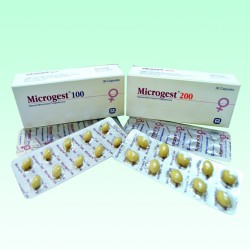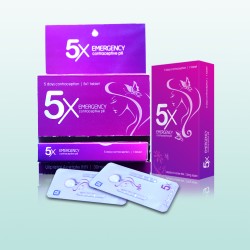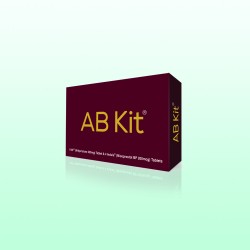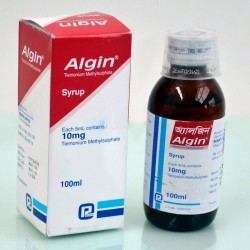Neogest 2mg Tablet 10's Pack

Neogest 2mg Tablet 10's Pack
৳ 500.00/=
Ex Tax: ৳ 500.00/=
- Stock: In Stock
- Model: Medi-01024
- Generic: Dienogest
- Pack Size: Each pack contains Neogest 2mg Tablet 10's Pack
0 items sold
6115 views
Available Options
Indications
Dienoaest is indicated for the treatment of endometriosis.
Therapeutic Class
Female Sex hormones
Pharmacology
Dienogest is a nortestosterone derivative with no androgenic but rather an antiandrogenic activity of approximately 1/3 of that of cyproterone acetate. Dienogest binds to the progesterone receptor of the human uterus with only 10% of the relative affinity of progesterone. Despite its low affinity to the progesterone receptor, dienogest has a strong progestogenic effect in vivo. Dienogest has no significant androgenic, mineralocorticoid or glucocorticoid activity in vivo.
Dienogest acts on endometriosis by reducing the endogenous production of estradiol and thereby suppressing the trophic effects of estradiol on both the eutopic and ectopic endometrium. When given continuously, dienogest leads to a hypoestrogenic, hypergestagenic endocrine environment causing initial decidualization of endometrial tissue followed by atrophy of endometriotic lesions. Additional properties eg, immunologic and antiangiogenic effects, seem to contribute to the inhibitory action of dienogest on cell proliferation.
Dienogest acts on endometriosis by reducing the endogenous production of estradiol and thereby suppressing the trophic effects of estradiol on both the eutopic and ectopic endometrium. When given continuously, dienogest leads to a hypoestrogenic, hypergestagenic endocrine environment causing initial decidualization of endometrial tissue followed by atrophy of endometriotic lesions. Additional properties eg, immunologic and antiangiogenic effects, seem to contribute to the inhibitory action of dienogest on cell proliferation.
Dosage & Administration
Tablet-taking can be started on any day of the menstrual cycle.
The dosage of Dienogest is 2 mg daily without any break, taken preferably at the same time each day with some liquid as needed. Tablet must be taken continuously without regard to vaginal bleeding. When a pack is finished, the next one should be started without interruption.
In the event of missed tablet(s), the woman should take 2 mg only, as soon as she remembers, and should then continue the next day to take the tablet at her usual time. A tablet not absorbed due to vomiting or diarrhea should likewise be replaced by 2 mg.
The dosage of Dienogest is 2 mg daily without any break, taken preferably at the same time each day with some liquid as needed. Tablet must be taken continuously without regard to vaginal bleeding. When a pack is finished, the next one should be started without interruption.
In the event of missed tablet(s), the woman should take 2 mg only, as soon as she remembers, and should then continue the next day to take the tablet at her usual time. A tablet not absorbed due to vomiting or diarrhea should likewise be replaced by 2 mg.
Interaction
Progestogens including Dienogest are metabolized mainly by the cytochrome P450 3A4 system . Therefore, inducers or inhibitors of CYP3A4 may affect the progestogen drug metabolism. Known CYP3A4 inhibitors like azole antifungals (e.g, ketoconazole, itraconazole, fluconazole), cimetidine, verapamil, macrolides (e.g, erythromycin, clarithromycin and roxithromycin), diltiazem, protease inhibitors (e.g, ritonavir, saquinavir, indinavir, nelfinavir), antidepressants (e.g, nefazodone, fluvoxamine, fluoxetine) may increase plasma levels of progestogens and result in adverse reactions.
Contraindications
Hypersensitivity to dienogest or to any of the excipients of Dienogest. Dienogest should not be used in the presence of any of the conditions such as, Active venous thromboembolic disorder; arterial and cardiovascular disease, (e.g, myocardial infarction, cerebrovascular accident, ischemic heart disease); diabetes mellitus with vascular involvement; presence or history of severe hepatic disease as long as liver function values have not returned to normal; presence or history of liver tumors (benign or malignant); known or suspected sex hormone-dependent malignancies and undiagnosed vaginal bleeding.
Side Effects
Increased weight; depressed mood, sleep disorder, nervousness, loss of libido, altered mood; headache, migraine; nausea, abdominal pain or distension, flatulence, vomiting; acne; alopecia; back pain; breast discomfort, ovarian cyst, hot flush, uterine/vaginal bleeding including spotting; asthenic conditions, irritability.
Pregnancy & Lactation
Use in Pregnancy: There are limited data from the use of Dienogest in pregnant women. Animal studies and data from women exposed to Dienogest during pregnancy reveal no special risks on pregnancy, embryonic/fetal development, birth or development after birth for humans. However, Dienogest should not be administered to pregnant women because there is no need to treat endometriosis during pregnancy.
Use in Lactation: Treatment with Dienogest during lactation is not recommended. Physiochemical properties and animal data indicate excretion of Dienogest in breast milk. A decision must be made whether to discontinue breastfeeding or to abstain from Dienogest therapy taking into account the benefit of breastfeeding for the child and the benefit of therapy for the woman.
Use in Lactation: Treatment with Dienogest during lactation is not recommended. Physiochemical properties and animal data indicate excretion of Dienogest in breast milk. A decision must be made whether to discontinue breastfeeding or to abstain from Dienogest therapy taking into account the benefit of breastfeeding for the child and the benefit of therapy for the woman.
Precautions
Before starting Dienogest treatment, pregnancy must be excluded. During treatment, patients are advised to use nonhormonal methods of contraception (e.g, barrier method) if contraception is required.
As Dienogest is a progestogen-only preparation, it can be assumed that special warnings and special precautions for use of other progestogen-only preparations are also valid for the use of Dienogest .
Changes in Bleeding Pattern: Dienogest treatment affects the menstrual bleeding pattern in the majority of women.
Hepatic Impairment: Dienogest is contraindicated in patients with present or past severe hepatic disease.
Impairment of Fertility: Based on available data, ovulation is inhibited in the majority of patients during treatment with Dienogest. However, Dienogest is not a contraceptive.
If contraception is required, a nonhormonal method should be used.
As Dienogest is a progestogen-only preparation, it can be assumed that special warnings and special precautions for use of other progestogen-only preparations are also valid for the use of Dienogest .
Changes in Bleeding Pattern: Dienogest treatment affects the menstrual bleeding pattern in the majority of women.
Hepatic Impairment: Dienogest is contraindicated in patients with present or past severe hepatic disease.
Impairment of Fertility: Based on available data, ovulation is inhibited in the majority of patients during treatment with Dienogest. However, Dienogest is not a contraceptive.
If contraception is required, a nonhormonal method should be used.
Overdose Effects
Acute toxicity studies performed with Dienogest did not indicate a risk of acute adverse effects in case of inadvertent intake of a multiple of the daily therapeutic dose. There is no specific antidote. Dienogest 20-30 mg/day (10-15 times higher dose than in Dinogest) over 24 weeks of use were very well tolerated.
Use in Special Population
Use in Children: Dienogest is not indicated in children prior to menarche. The safety and efficacy of Dienogest in adolescents (menarche to 18 years) has not yet been established.
Use in the Elderly: There is no relevant indication for the use of Dienogest in the geriatric population.
Use in the Elderly: There is no relevant indication for the use of Dienogest in the geriatric population.
Storage Conditions
Keep in a cool and dry place. Protect from light. Keep out of the reach of children.
Source: medex.com.bd












